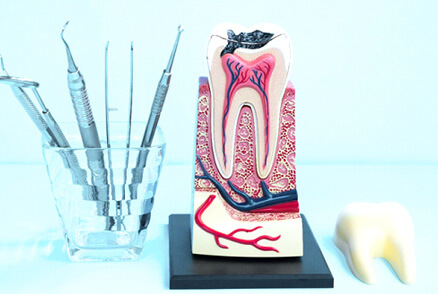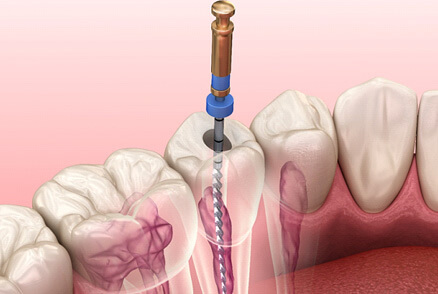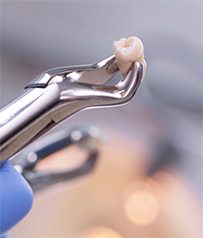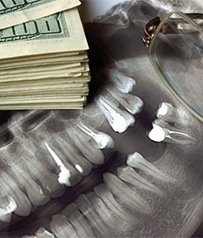Root Canal Treatment – Glenpool, OK
Make Your Tooth Feel Whole Again

When your tooth is really hurting, it can be hard to think of anything but relief. Serious toothaches are absolutely debilitating, impairing your ability to do what you need to do. Thankfully, root canal treatment can deal with this issue without the need to remove your tooth.
If you live near Glenpool, OK, visit us here at 918 Dentist. We’ll be able to use root canal treatment to make your tooth feel whole again! Make an appointment with us, and we’ll have you feeling better in no time at all.
Why Choose 918 Dentist for Root Canal Treatment?
- Compassionate Dental Team Focused on your Comfort
- Same Day Dental Crowns Available for Your Convenience
- Comfortable, Modern Dental Office with Multiple Locations
Do I Need Root Canal Treatment?

Root canals can treat severe infections within the tooth by removing the root pulp. Such infections are generally associated with persistent throbbing toothaches, as well as swelling or discoloration of the tooth. You might also experience some other symptoms of infection, like inflamed gums or a foul taste in your mouth.
If you’re dealing with these issues, a root canal could be just what you need to feel your best again.
The Root Canal Process

To begin the root canal treatment, we will use powerful local anesthetics to numb your tooth completely. This ensures that you won’t feel a thing over the course of the procedure.
We’ll then make use of small, specialized instruments to open a hole in the tooth. This will allow us to reach the infected root pulp within, which we will then remove. We’ll also clean out the interior of the tooth in order to remove any residual bacteria.
Once this is done, we will fill the hole with a substance called gutta percha. This is a natural plastic that can give additional structure to the tooth.
Finally, we’ll top off your tooth with a dental crown. At 918 Dentist we make use of same-day dental crown technology, meaning that you won’t have to wait to get the restoration you need. You’ll leave our office with a completely whole, perfect new tooth.
The Benefits of Getting a Root Canal

Root canal treatment doesn’t have the best reputation among patients, which is a little bit of a shame. This treatment is a quick and painless method of dealing with a serious toothache without the need for a tooth extraction. This also means that you won’t need to worry about paying for a tooth replacement, saving you a fair amount of money in the long run.
Root canaled teeth are usually able to stick around for decades, if not your entire lifetime, and are discreet enough to blend in perfectly with the rest of your smile. If you have a serious toothache, make an appointment with us and we’ll be happy to talk to you about what this treatment could do for you!
Understanding the Cost of Root Canals

We completely understand if the idea of a root canal makes you anxious, and the last thing we want is for the financial component of the procedure to contribute to that. For that reason, we do everything that we can to make the process of paying for your root canal treatment as stress-free as it can be.
We’ll be able to talk to you in greater detail about what your root canal treatment is likely to cost when we meet you in person for your consultation. Until then, here’s what you should know.
Factors That Can Affect Root Canal Cost

It’s really difficult to tell you whether you’re going to pay for a root canal before we meet you in person, because there are many factors that can contribute to the cost of your services. The type and location of the tooth, for example, can be a factor; molars have more root pulp than bicuspids and incisors, and may therefore be more complicated to treat.
In some especially complex cases, an oral surgeon may need to be brought in to complete the procedure. They’ll have their own rates for care that they’ll be able to tell you more about.
Finally, most root canals are capped off with a dental crown, the cost of which you’ll need to factor into your overall budget.
Is it Cheaper to Pull My Tooth?

If you’re only looking at the upfront cost of the treatments, you might think that pulling your tooth is a cheap alternative to a root canal. However, this isn’t necessarily the case. There’s a hidden cost associated with a tooth extraction, one that many patients don’t necessarily consider—tooth replacement.
Leaving a gap in your smile after a tooth has been removed is a terrible idea. This can lead the surrounding teeth to move out of place, impair your ability to eat what you’d like, and even cause the jaw underneath to shrink. For this reason, replacing your tooth with a denture, dental implant, or dental bridge is important.
When you factor in the cost of this procedure, root canals are the much cheaper option.
Does Dental Insurance Cover Root Canals?

Dental insurance is usually happy to cover at least a portion of your root canal procedure. Depending on the details of your plan, you can generally expect anywhere from 50% to 80% of the total cost of your procedure to be covered.
That said, every plan is different. We’ll help you consult with your insurance company to make sure that you’re getting the most out of your benefits.
Other Options for Making Root Canal Treatment Affordable

If you don’t have insurance, you may need to pursue alternatives that can make your root canal treatment a little bit more affordable. You’ll be happy to learn that we’re currently offering a special on emergency exams, which can make it easier to check what’s going on with an aching tooth.
We also have an in-house membership plan—for just $24 a month, you can get substantial discounts on many of the procedures you’ll receive from us. We also frequently work with financing firms like Cherry and Sunbit, which can allow you to split the cost of your dental care across several months.
If you have any questions about how you can make the care you receive from us more affordable, reach out to us today!
Root Canal FAQs
What Should I Do Before a Root Canal?
Before you get a root canal, you should do a few things to prepare for it. You’ll then have an easier and smoother treatment experience.
For instance, don’t use tobacco products right before your procedure starts. These items can interfere with numbing agents, making your root canal uncomfortable. The result would be an unpleasant treatment that has unwanted side effects in the long run.
Similarly, you could take an over-the-counter pain reliever (like ibuprofen) right before care. Doing so will reduce your discomfort as the numbing agent wears off. From there, you’d recover more quickly and comfortably.
How Long Does a Root Canal Take?
The average root canal only takes one 30–90-minute dental visit. That said, the treatment’s timing tends to vary from patient to patient. How long your own goes will depend on your situation.
In rare cases, a root canal may take two separate dental appointments. The first one would simply place a temporary, antibacterial medicine in your tooth. Only at the later visit would the dentist clean out your tooth’s “pulp” or innards.
A root canal can also take a long while if it involves molars. Teeth in the back of your mouth have more dental roots, so disinfecting them requires more time.
Do I Need Antibiotics Before or After My Root Canal?
Normally, patients don’t need antibiotics before or after a root canal. Removing a tooth’s infected pulp is often enough to treat and save it, ensuring oral health. Adding an antibiotic to the mix would overly complicate things.
All that said, some patients may need to take an antibiotic before a root canal. They could have a health condition that raises their risk of infection after a dental procedure. Given that possibility, your dentist will review your medical history to see if you should take antibiotics.
How Much Pain is Normal After a Root Canal?
Your actual root canal shouldn’t hurt, but it may leave your mouth a bit sore and achy afterward. This symptom is typical and temporary; it’ll naturally fade after a few days.
There are several ways you could manage any post-treatment pain. For starters, over-the-counter pain relievers (acetaminophen, ibuprofen, etc.) should relieve your aches. You could also apply an ice pack or cold compress to reduce soreness or swelling. Most crucially, you can avoid worse discomfort by not chewing hard foods during recovery.
I Need a Checkup & Cleaning I Have a Cavity or Broken Tooth I Need a Dentist for My Child I Want a Straighter Smile I am Unhappy with My Smile I am in Pain & Need Help I am Concerned About Bleeding Gums I am Missing One or More Teeth I am Scared of the Dentist I am Concerned about Sleep Apnea View Our Services
